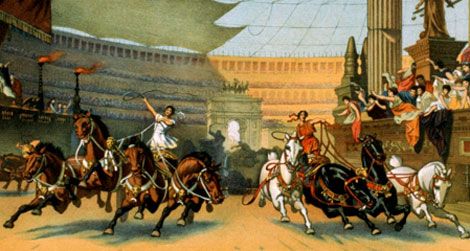

And wealthy people do not like being taxed. And the Greens were the party of the plebs, the people."Īs I said earlier, Justinian was focused on taking back the Roman Empire's lost territory. "The Blues were the sort of party of the authorities - the Emperor himself, Justinian, was a well-known partisan of the Blues. "There is one group of historians who essentially say that the Blues and Greens were effectively almost prototype political parties," Dash says. And this is where sports and politics really become intertwined. Both had big followings in Constantinople. They also wagered large sums of money on the races.Īt the time, there were two rival chariot racing teams: the Blues and the Greens. It didn't help that spectators sometimes tossed nail-studded tablets onto the track. (Imagine the Queen of England having her own tunnel directly into Wembley Stadium.)ĭown below, up to 12 charioteers, each on a chariot pulled by four horses, raced around a track just 150 feet wide. It held around 100,000 people.Ī secret passageway connected the Imperial Palace directly to the imperial box, where the emperor would watch the chariot races from his throne. It was about four times the size of a football field and shaped like a massive horseshoe. The biggest of all was right in Constantinople. Gladiatorial contests had mostly died out by the sixth century, but most cities across the Empire had their very own chariot racing stadiums. "I mean, they were the NFL and the MLB rolled into one in terms of sporting entertainment."ĭuring the days of Roman Empire, leaders tried to win favor by putting on elaborate games. "They were massively popular events," Dash says. But we’re getting ahead of ourselves.įirst, we have to learn about the Imperial pastime: chariot racing.

Theodora may not have been the obvious pick for the job, but she was smart and she understood the citizens of Constantinople - qualities that would one day play a critical role in preserving Justinian’s reign. It’s believed that Justinian attended one of Theodora’s performances and was absolutely smitten - which explains how a bearkeeper’s daughter turned courtesan ended up as Empress.

"There was no shame in the girl, and no one ever saw her dismayed." But only gave her youth to anyone she met, in utter abandonment," Procopius wrote. "She became a courtesan, and such as the Ancient Greeks used to call, a common one, at that: for she was not a flute or harp player, nor was she even trained to dance. "There was no shame in the girl, and no one ever saw her dismayed." Procopius Theodora grew up to become an actress, which, Procopius explains, had a very different meaning back then. As was likely the fate of many bearkeepers, Theodora's father died unexpectedly.Ī lot of what we know about Theodora comes from a contemporary historian named Procopius. Her name was Theodora, and she was the daughter of a bearkeeper. Theodora: Bearkeeper's Daughter, Courtesan, Empress She was "the most scandalous woman of the age," Dash says. The second thing you need to know about Justinian is that he married a prostitute. "He felt, I think, fairly strongly that the Roman Empire had taken a huge hit before his reign, and that it was his duty, really, as emperor to try and reconquer as much of that as possible," says historian Mike Dash. Justinian ruled the Eastern Roman (also known as the Byzantine) Empire out of Constantinople. Justinian came to power in 527 A.D., about 50 years after the fall of the Western Roman Empire. The first thing you need to know about the Emperor Justinian is that his motto was essentially "Make The Roman Empire Great Again." (Hulton Archive/Getty Images) This article is more than 4 years old. The Hippodrome in Constantinople was the largest chariot racing stadium in the Eastern Roman Empire and the site of the Nika Riots.


 0 kommentar(er)
0 kommentar(er)
